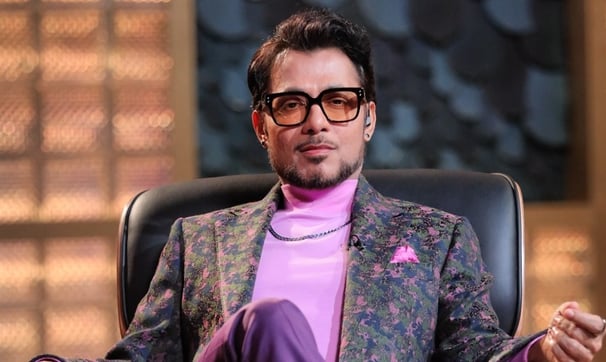Anupam Mittal’s Kashmir Trip Amid Tensions: A Bold Move or a Risky Gamble?
LATEST NEWS


On May 16, 2025, at 1:00 PM IST, Anupam Mittal, the renowned Shark Tank India judge and founder of Shaadi.com, made headlines with a surprising announcement on LinkedIn: he has booked tickets to travel to Kashmir with his family. This decision comes at a time of heightened tensions in the region, following the recent Pahalgam terror attack and escalating India-Pakistan conflicts, including Operation Sindoor airstrikes near Sargodha. Mittal’s move has sparked both admiration and controversy, raising questions about the balance between solidarity, safety, and the broader implications of promoting tourism in a conflict zone. Let’s unpack the context, reactions, and what this means for Kashmir and India.
The Context: Why Kashmir, Why Now?
Kashmir has long been a paradise for tourists, known for its breathtaking landscapes and rich cultural heritage. However, the region has also been a hotspot for geopolitical tensions, with recent events amplifying security concerns. Just days ago, a terror attack in Pahalgam—a popular tourist destination—sent shockwaves through the nation. Concurrently, India’s Operation Sindoor targeted military installations in Pakistan, further escalating tensions. Amid this volatile backdrop, the Indian government and local Kashmiri leaders have been urging citizens to continue visiting the region to support its tourism-dependent economy, which has suffered due to recurring unrest.
Anupam Mittal’s decision to travel to Kashmir aligns with this call to action. In his LinkedIn post, shared at 1:00 PM IST on May 16, 2025, Mittal wrote, “If we vanish, they win. If we travel, Kashmir & India win,” accompanied by hashtags #ChaloKashmir and #JaiHind. His intention is clear: to stand in solidarity with the people of Kashmir and boost the local economy by encouraging tourism at a time when fear might deter visitors. As a prominent public figure with a net worth of ₹185 crore and a platform that reaches millions, Mittal’s move carries significant symbolic weight.
Mixed Reactions: Support and Skepticism
The announcement has elicited a polarized response, particularly on social media platforms like X. Some users have praised Mittal’s courage and patriotism, viewing his trip as a powerful statement against terrorism. One X user wrote, “Anupam Mittal is setting an example—Kashmir needs our support now more than ever. #ChaloKashmir.” Others echoed this sentiment, highlighting the economic struggles of Kashmiri locals who rely on tourism for their livelihoods, especially after years of conflict and the economic fallout from the 2019 revocation of Article 370.
However, not everyone is on board. Critics on X have raised concerns about the timing of Mittal’s trip, pointing to the ongoing security risks in the region. Operation Keller, a counter-terrorism mission in South Kashmir’s Anantnag and Kulgam districts, is currently underway, with security forces actively engaging militants. Just hours ago, at 3:20 PM IST on May 16, 2025, reports confirmed that two foreign terrorists were neutralized in Kulgam, underscoring the active threat. Some X users questioned the wisdom of traveling to a conflict zone, with one stating, “Tourism is important, but safety first. Anupam Mittal’s trip could put his family at risk and send the wrong message.” Others expressed a deeper concern: the possibility that tourism revenue might indirectly fund terrorism, given the complex socio-political dynamics in the region.
The Bigger Picture: Tourism as a Tool for Resilience
Mittal’s decision taps into a broader narrative about the role of tourism in conflict zones. Kashmir’s economy heavily depends on visitors, with the sector contributing significantly to the region’s GDP. In 2024, Kashmir saw a record 2.11 million tourists, but incidents like the Pahalgam attack threaten to reverse these gains. By choosing to travel now, Mittal aims to counter the narrative of fear and encourage others to follow suit, potentially inspiring a wave of domestic tourism that could provide much-needed economic relief to locals.
However, the risks cannot be ignored. The Indian government has issued travel advisories for Kashmir in the past, and while no specific advisory is in place as of May 16, 2025, the recent spate of violence has heightened concerns. Mittal, as a high-profile individual, may also attract unwanted attention, potentially making him a target. Additionally, the optics of a celebrity vacationing in a region where locals face daily uncertainties could be perceived as tone-deaf by some.
What’s Next: A Call to Action or a Cautionary Tale?
Anupam Mittal’s trip to Kashmir is a bold move that reflects both his personal conviction and his influence as a public figure. If successful, it could inspire others to visit the region, sending a powerful message of resilience against terrorism and supporting Kashmir’s economy at a critical juncture. However, the risks—both to his family’s safety and the broader implications of promoting tourism in a conflict zone—are real and cannot be overlooked.
For now, Mittal’s journey serves as a litmus test for how India navigates the delicate balance between normalcy and security in Kashmir. As the situation unfolds, his trip may either become a rallying cry for unity or a cautionary tale about the complexities of conflict tourism. One thing is certain: at 3:20 PM IST on May 16, 2025, Anupam Mittal has put Kashmir back in the spotlight, for better or for worse.